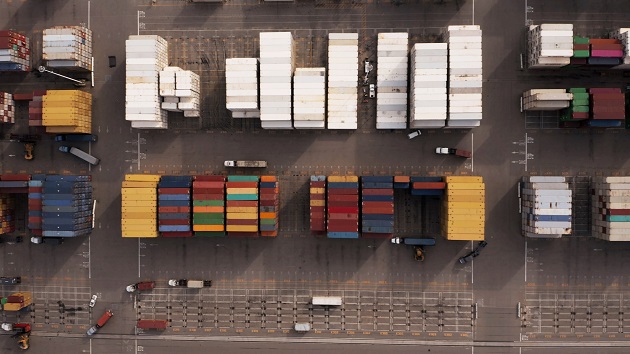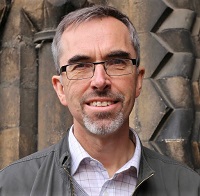“The Bible says debt is a form of enslavement, and interest a means of oppression”
The last decade has seen a worsening of the working conditions which affect “family relationships”, says Jonathan Tame. The near future will probably be shaped by the ‘gig economy’ and the re-balancing of global capitalism.
CAMBRIDGE · 06 MARCH 2020 · 10:45 CET

How have the developments of the economy changed Europe in the last ten years?
The financial crisis of 2008, its impact on families, the high unemployment rates in many regions, the emergence of new technologies and the ‘gig economy’… Much has changed in the last years and there are many question marks about how our globalised economy will look like in the future.
In the series of interviews about the last decade, Evangelical Focus interviewed Jonathan Tame, the Director of the Jubilee Centre (Cambridge, UK), a Christian social reform organisation that offers a biblical perspective on contemporary issues and trends in society.
[To listen to the audio version of this interview, go to the bottom of the page]

A. In many ways I think we have ended up were we began about 12 years ago. Last week here in Britain, people’s real incomes returned to the level they were in 2008, before the crash. At the end of the decade, we have also gone back to very high levels of debt. But over the decade, interest rates have remained incredibly low, and inflation and economic growth have remained low across Europe. In some areas, things have not changed.
But we have seen that jobs have become a lot more precarious, productivity and wages have been stagnant. Obviously there was the crisis in the Euro around 2012-13, which pushed unemployment very high back then, and the recovery has been quite uneven since then. Some countries are back to very high levels of employment, but in the south (Spain, Italy, Greece…) unemployment levels have remained really stubbornly high, especially for young people.
So there is quite a different experience in different parts of Europe.
Q. You mentioned the precarious jobs and low wages. An example of that is a much praised film in the UK, titled “Sorry We Missed You”, a story about a man who starts working as a deliveryman in one of the new businesses such as Amazon, Uber… What ‘curses’ come with these new types of jobs linked to mobile phone ‘apps’ and the new ‘needs’ of costumers to have everything as fast and as cheap as possible?
A. Yes, it has been very interesting in the last decade that the combination of the new technologies that developed, especially smartphone apps, and that high unemployment at the beginning of the decade following the financial crisis, created the perfect conditions for what we call the ‘gig economy’ to emerge.
This form of capitalism, if you like, has developed where we have a cultural individualism and a market economy; but the consumer’s choice and freedom are becoming the most important thing of all. So we have 24/7 shopping, and somehow, we accept the ‘curse’ zero-hours contracts. And people who have to deliver this service are people we don’t really see, that are kind of invisible and anonymous. They are working having very anti-social hours and often not given much advance warning, only one day or two before they are told when they can work. This makes the worker in this ‘gig economy’… Well, it is a new kind of oppression, to be honest.
The loss of rights, the loss of freedom, especially for family relationships which came out in the film, is a very high price to pay for this new kind of consumerism – the new way we do buying and selling. So yes, it is something we should look out very critically.

Q. During Davos 2020, there has been much discussion about reforming capitalism so that it better serves people. Your job at the Jubilee Centre has much to do with reflecting on how our economy, our workplace, our businesses could be more “relational”. To what degree can our current global economic system can achieve this aim?
A. To make it more relational, I think we do need to ask hard questions of capitalism. Capitalism means different things to different people, and I am not talking about the idea of an enterprise economy, freedom to start businesses and trade. But rather, we have to think about why is capitalism is called that? It is because the owners of capital are sitting at the top of the pyramid, and the whole capitalist system is geared to deliver financial returns to the owners of capital. And this system is losing its legitimacy, and people are calling it into question now. Even people in the highest levels of this system are really beginning to say: ‘is it fit for purpose anymore?’ We have been saying that for a long time.
So, in terms of what are the alternatives… Since 1989-90, we said ‘communism has failed, so that leaves capitalism as the only show left in town and talked about ‘the end of history’ and so on. But what we have seen since then is a pretty ugly development of this only show in town, and people are not sure they want to continue to be part of it anymore. But there does not seem to be any alternative around.
Part of what we have to do is to think through all this, and the Bible gives us some really good concepts and frameworks for doing that. Putting people first, and particularly, relationships. One way in which we can think about this is talking about the idea of a ‘stakeholder economy’. In the end, every organisational business has a set of stakeholders, different people involved in producing a good or a service, or it is running a school or a hospital. There are always different stakeholders that have different roles. And the person in business, the people providing the capital, are just one of the stakeholders. When we look at the whole of that organisation, it exists for a certain purpose, and we look at the contributions and the benefits for all these stakeholders and we start to think about the relationships between them, then we can begin to imagine how we can move towards more of a stakeholder economy, and changes that we can be made.
There are also some radical and far-reaching policy changes which could be made to change the system drastically. One of them is to remove the tax-preference for debt. Because most tax systems would give preference to debt because they make interest payments at deductible expense, and that way we baked into the system this tendency to run on debt. If we took away that advantage, which is a simple policy decision, it would have to be made across the board.

Q. Many of us who are not experts in economy do not fully understand what the consequences of debt are for the normal life of families. Could you briefly explain this for us?
A. The thing is that we have come to see debt as a convenience, and interest payments as simply the price for that convenience. But the Bible uses very different language around that. It says that debt is really a form of enslavement, the borrower is the slave of the lender. And it talks about interest as a means of oppression.
And it is true, that so often the highest rates of interest are paid by the poorest people, those who have the least to offer as a guarantee for their borrowing.
There are various reasons why debt is so damaging and so dangerous. Most people borrow money assuming that everything will go well in the future and they will be able to pay back in the future at whatever rate they agree to pay. But often people come to a place of desperation and debt is the last resort. There is a very frightening statistic, here in Britain at least: around one third of all households have no savings at all. No savings put aside for an unexpected payment, a demand, or for if you are sick and cannot work for a while... So people have to borrow, they do not have a cushion of savings. That itself is a very worrying trend.
But as I said, people assume everything is going to go well and they will be able to carry on making payments, but life is not like that. Life goes up and down: accidents happen, people can unexpectedly lose a job, and suddenly you are no longer able to make those same payments. So debt does make you very vulnerable, and because most debt is very anonymous now, you cannot go to the person you owe the money, because there is not a person. There is only a nameless, faceless institution, so you cannot say: ‘Oh, I’m having a difficult time, can I hold off payment for a month or two’.
Now there are more and more debt advice charities that do have that power to go. I have actually been trained to be a debt counsellor myself, and have seen that if you stand in as an advocate for someone who is struggling to pay their debts. You can have a bit of a human contact on behalf of someone else and you can get debts put on hold and interest charges stopped, until they can get back to a position in which they can pay.
But debt is very dangerous, and especially long-term debt. At a government level it is even more dangerous, because so much of the debt is rolled over from year to year. And we are pushing the repayment burdens down to future generations. So we are spending our children and grandchildren’s income and wealth which is a deep injustice.

Q. Thinking about the global economy: China seems to have become a giant dragon as traditional economic powers lose strength. How will the balance of economic power change in this new decade?
A. That’s the question that economic analysts are paid large amounts of money to try to answer. There have been quite a few predictions coming out at the beginning of this decade and in the last few weeks.
Certainly we have seen the rise of China and India, and their growth rates will continue to be much higher than in Europe and the Western world. There will be a steady re-balancing of the world economy towards Asia. Unless we find new ways of increasing productivity here in Europe, our share of global GDP will continue to decline inevitably. So I think we will see the influence and weight of Western countries in some of the global institutions like the International Monetary Fund (IMF) decline. The bigger Asian economies will be calling the shots, or at least demanding a greater say.
The influence of technology is going to be huge in these trends. The race for quantum computing is a fascinating thing to look at as well. That is a whole new generation of internet technology which can also change the balance of power. China is spending a huge amount of money in the race to be the first country that can implement quantum computing.
The trade wars, which were a bit of an unknown until the election of Trump as the US President, because there had been a pretty big commitment to try and keep trade flowing and free. The rise of populism in the last years could well mean there could be other constraints on global trade which could also affect the balance of power in different ways.
But we are also seeing right now with the Coronavirus spread the vulnerability of our highly globalised economic systems. Just right now you see a slowdown of the Chinese economy. A lot of factories have been shut there, and it gives short term opportunities for European producers. I was just reading this morning about how the few British textile factories that have survived in recent decades are suddenly overwhelmed with orders, as alternative sources of production are needed.
And then we should not forget the rise of Africa, the only continent that is continuing to grow rapidly in population terms - and they are also growing in wealth. I think the influence of Africa’s influence will be seen towards the end of this decade.

Q. We find in the Bible much about money and how to use it. What are some Biblical values about how we hanlde the economy that can be useful for our current situation?
A. I think of three great principles here. One is stewardship, that we should continually be thinking about how we steward all that God has given to us. Be grateful for what we have, being able to take good care.
That leads to the second principle, that is generosity. We should be encouraged to give. There are always people that are worse off than we are. Giving helps us to make sure that money is our servant, not our master.
And thirdly, the principle of justice, one that most people will resonate with if they are not Christians. Regarding how money and wealth is distributed. Fairness, and ensuring that people are not exploited or oppressed. Despite our awareness to justice, the fact that we still want to buy things as cheap as possible means that there is pressure up and down the supply chain in which we are actually participating in, if we do not ask the hard questions about the people involved in making the things that we buy.
So, stewardship, generosity and justice are three great Biblical principles that I think we can talk about and share with other people.
Published in: Evangelical Focus - life & tech - “The Bible says debt is a form of enslavement, and interest a means of oppression”
